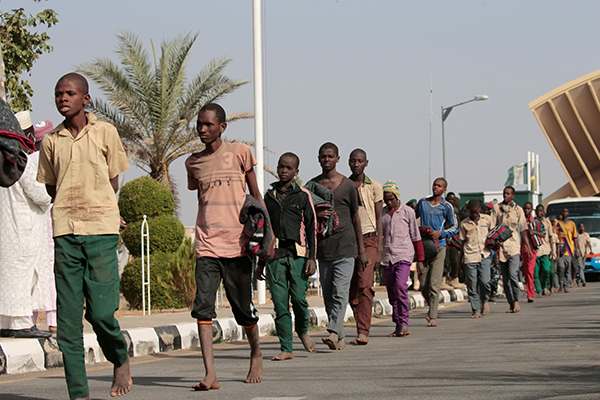
By Kurt Jensen
WASHINGTON (CNS) — The Catholic bishop of Gboko, Nigeria, and the Knights of Columbus added their voices to a Dec. 17 congressional hearing spotlighting sectarian violence in Nigeria in which thousands of Christians have been killed simply for their faith identity.
The hearing of the Tom Lantos Human Rights Commission was spurred by recent developments: the fatal shooting of 51 peaceful protesters in Lagos Oct. 20; the kidnapping of over 300 schoolboys in Kankara, which government officials there said was instigated by bandits masquerading as the Islamist terrorist group Boko Haram; and the Dec. 7 State Department designation of Nigeria as “a country of particular concern” under the International Religious Freedom Act of 1998.
The boys were rescued Dec. 18, and while the hearing included discussion of a congressional resolution of condemnation plus the imposition of sanctions, it didn’t get into the specifics of either response. Sanctions would become a decision of the incoming Biden administration.
“This is a genocide that’s happening right before our eyes,” said Republican Rep. Chris Smith of New Jersey, the commission’s co-chair.
“It is depressing that our Middle Belt region has truly become a vale of tears, a region where mass burials are very common,” said Bishop William A. Avenya of Goboko. “Since the consistent attacks began some five years ago, there has hardly been a single day without killing in one part of the region or the other.
“In fact, one cannot give the accurate figures of those who have been killed since the beginning of these atrocities,” he said.
“Interestingly,” Bishop Avenya continued, “no one has ever been arrested or questioned or prosecuted or convicted of any charge related to this spree of killings. Yet, these killers are not invisible, neither are they unknown. Instead, these atrocities are made to look as though they were ethnic or communal clashes.”
“Nigeria’s Christians have suffered grievously at the hands of Boko Haram and other groups,” said Carl Anderson, Supreme Knight of the Knights of Columbus, in a statement. “The Christians of Nigeria, both Catholic and Protestant, deserve attention, recognition and relief now.”
The death toll from the conflict in Nigeria’s Middle Belt region caused by the pastoralists, or cattle herders, who are mainly Muslim and ethnic Fulani, against farmers, who are predominantly Christian, relies on analyses from humanitarian groups, since it is never verified by the government.
An estimated 2,000 are believed to have been killed annually between 2011 and 2016 as the conflicts over land and a dwindling water supply, exacerbated by climate change, continue.
Religious organizations have urged the American government to pressure the Nigerian state to provide protection.
Earlier this year, the International Committee on Nigeria calculated, based on what they said were primary sources on the ground, that since 2015, Fulani militant attacks are “exponentially increasing,” killing more than 9,700 in the past five years.
Adding to the urgency, the latest statistical risk assessment of the Holocaust Memorial Museum’s Simon-Skjodt Center for the Prevention of Genocide calculated that Nigeria faces a 7.3% risk of experiencing a new mass killing by the end of 2021, the 6th highest in the world. In 2019, Nigeria was ranked 17th with a 5% risk.
Genocide has become virtually a daily threat, said Annigje J. Buwalda, executive director of Jubilee Campaign USA. “We would additionally ask that more consideration be proffered to … the rising frequency of deadly midnight attacks on predominantly Christian farming communities in Nigeria, which are carried out by groups of heavily-armed radical Islamist Fulani militants,” she said.
In November, Democratic Reps. Al Green and Joaquin Castro, both from Texas, introduced a House resolution supporting the peaceful protest movement in Nigeria.
“The resolution is not enough, but it is something we can do,” Green told the hearing. He said it meant “that Black lives matter, no matter where they may be.”
Robert Destro, an assistant secretary of state, said he hoped for an “early warning network” to detect atrocities before they occur.
But he said one principal difficulty is Nigerian officials have told him it’s “impossible” that religion is a factor in the killings. “They need active ground-level intelligence to be able to protect themselves.”
Destro said of President Muhammadu Buhari’s government, “They’re going to have to want to change.”
